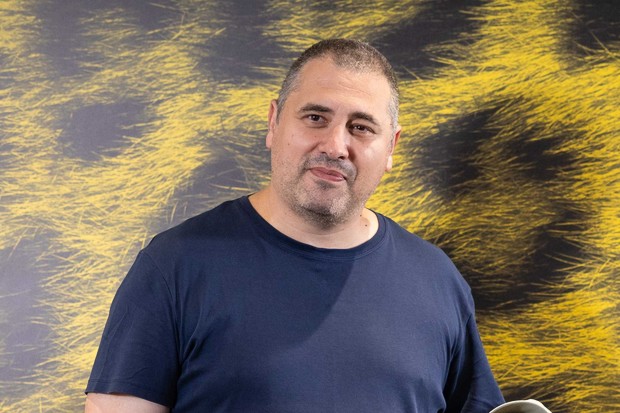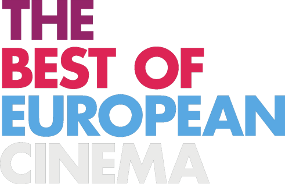Radu Jude • Director of Do Not Expect Too Much from the End of the World
“It is a very self-reflective film about what images mean and what cinema can be nowadays”
- The Romanian helmer breaks down his complex new feature of two halves, which provides witty comments on the digital environment and the altered nature of cinema

We sat down to talk to Radu Jude on the occasion of his latest feature Do Not Expect Too Much from the End of the World [+see also:
film review
trailer
interview: Radu Jude
film profile] being presented in the International Competition of the Locarno Film Festival. He shares some details about how the final concept of the film emerged while also expressing his opinions on capitalism in Romania and the flaws inherent in the current European film-funding system.
Cineuropa: In terms of form, your film is fragmentary, as you define it in your director’s notes, but in terms of content, it came out as a solid and comprehensive portrait of the present day. Were you aiming to achieve this result, or did it happen naturally?
Radu Jude: That’s difficult to answer. In my statement, I also quote Jacques Rivette, who says that cinema is not storytelling only; it is instead a descriptive essay, an art of juxtapositions and making connections. From this point of view, this is the result I was looking for – to use artistic means to create a complex portrait of today’s society.
It is a portrait not only of the reality of today’s society, but also of its reflection in the media.
I totally agree. It is a very self-reflective film about what images mean and what cinema can be nowadays. I don’t differentiate between cinema and social media any more; they have become one and the same thing. This dirty-talking Instagram avatar that the main character has is also part of the reflection – it was created by Ilinca Manolache, the actress who plays Angela, and I cast her together with the avatar.
Talking about juxtapositions, you draw a parallel with excerpts from the 1981 Romanian film Angela merge mai departe. Did you get the idea while building up Angela’s character, or did you come up with it throughout the creative process?
It all happened gradually. The main stories are inspired by real experiences that I had while working many years ago, either as an assistant on film productions or as a director of adverts. But for the first part, I wanted to watch this film from the 1980s again, which I did not remember very well – I just recalled that it was about a woman driving. Then I decided to include a cameo of Angela from back then, and later on, I came up with the idea to include a flashback from that film. In the end, I thought of binding them together and observing the differences in their representations in different periods. People might see the film as if it were comparing the Romania of today to Romania in 1981, but no: in both cases, I deal with representations.
The episodes from the old film perhaps elicit some nostalgia because they show that life was calmer back then. Or at least that’s how those times are presented.
I hate nostalgia as a feeling because it’s a dangerous one, but of course, the use of images from the past inevitably provokes it. And I am not sure that living calmly is necessarily good. Ion Iliescu, the first president of Romania after the Revolution in 1989, was actually a former apparatchik from the communist dictatorship. There were many protests against him, and he was only repeating that we needed silence and to be calmer. Hence, being calm is not always valuable, so I resist this interpretation. I can see it, but I don’t want it.
But isn’t the main source of your character’s suffering this constant distraction she’s exposed to? Not only the aggressive media environment, but also the gig economy, which demands constant multitasking.
Yes, she is forced to work continuously with no future and no certainty as to whether or not she will have a job next year. It’s true, and I think that one of the things that Romania did wrong, and is still doing wrong, is that after the fall of the communist regime, it embraced some savage kind of uncontrollable, neoliberal capitalism with no potential for social development, but also connected to political corruption. The poorer you get, the fewer opportunities you have. It was not mandatory to be like that – we could have had a free market and a more humane society at the same time.
As a freelance filmmaker constantly searching for ways to finance your projects, aren’t you also a victim of the gig economy?
Thank you for this question because I’m usually asked about the politics or the aesthetics in my films, but no one wants to know how I make a living. I used to work like my character for many years: I did all possible jobs. Now I am trying to live as a filmmaker only, and I have stopped doing advertising and television. People say I am making too many movies, but then who would pay my rent? So, again, I need to work a lot and make co-productions in the context of the corrupt, European system, where producers want to make money, not films. I remember how potential co-producers neglected my first feature-film project, The Happiest Girl in the World [+see also:
trailer
film profile], because the budget was too small and they would not get the percentage they expected. In cases like that, budgets get artificially inflated so that producers can earn money. That’s how we have European films with three people talking in a room backed by budgets of €4 million, for example.
Are you working on anything new?
I have just finished editing a found-footage documentary made together with my philosopher and film-theorist friend Christian Ferencz-Flatz, which is an attempt to reconstruct the history of Romania after the Revolution by using only advertising images. I am also searching for additional financing for my other film Dracula Park, which is quite complex, but is also designed to be funny and popular. It started off as a joke – some producers did not want to support Bad Luck Banging or Loony Porn [+see also:
film review
trailer
interview: Radu Jude
film profile], so I said: “What if I make a Dracula film?” They liked the idea, so here I am.
Did you enjoy reading this article? Please subscribe to our newsletter to receive more stories like this directly in your inbox.















